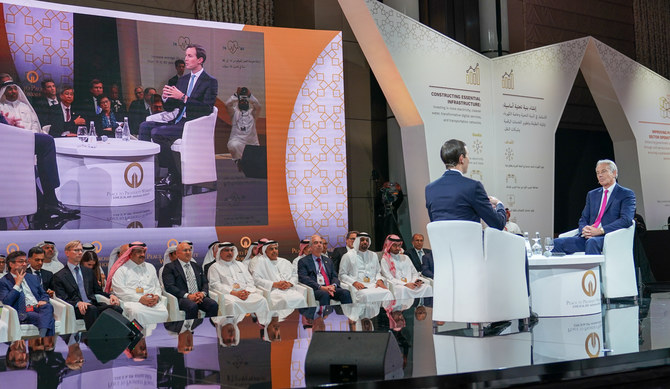
- ARAB NEWS
- 01 Jul 2025

As the G20 summit concluded in Osaka, I could not help but imagine how great it would have been if last week’s Peace to Prosperity workshop in Bahrain had taken a different path. Indeed, think what would have happened if both Israelis and Palestinians had not only come to Manama but also agreed on a negotiation agenda, and Jared Kushner had flown to Japan bearing the good news.
I imagine the final communique of the Osaka summit would have included an endorsement and a pledge of political and financial support from the world’s 20 biggest economies.
Alas, there was no agreement in Manama, mainly because the Palestinian leadership boycotted the workshop. In addition, the Israeli government remains in limbo until new elections in September.
Two things must be said about the Bahrain workshop. First, while there is much ambiguity and skepticism about the unannounced political element of Kushner’s peace plan for the Palestinian-Israeli conflict, there is no question that his team did an impressive job on the economic front; the details show a great deal of thought and planning for what it would take not only to reignite and sustain the Palestinian economy, but also to help neighboring countries by making Jordan, Lebanon and Egypt beneficiaries.
Second, it is difficult to disagree with Kushner’s view that the Palestinian boycott was a “strategic mistake.” While we as Arabs have always respected the Palestinian leadership’s decisions, and always will, many of us — respectfully — disagree with the decision not to attend the Manama workshop.
“If we pass on this opportunity, what guarantees are there that the next one — if indeed there is one — will be any better?”
Faisal J. Abbas
We do so because the Palestinian no-show only enhanced Israel’s image, further damaged the relationship with Washington, and provided opportunities for second-guessing the Palestinian side’s intentions and seriousness.
In contrast, sending even a low-level representative or spokesperson would have been sufficient to take control of the narrative. Mere participation would not necessarily have meant accepting the yet-to-be revealed political terms (all that is known so far is that, as previously reported in this column, they will not be based on the 2002 Arab Peace Plan, but will contain some elements of it).
Not to cry over spilt milk, but the strategic move would have been for the Palestinian side to use the workshop (which by default was attended by sympathetic countries, NGOs, businesses and potential donors) to fight for their just cause and rally support for more favorable political terms.
Of course, those who pretend to be friends of Palestine, such as Qatar and Iran, argue otherwise (Qatar waged a nasty media campaign urging others to boycott the workshop, then hypocritically sent its Minister of Finance).
Palestinian officials may have chosen to boycott Manama in the hope that it would demolish the whole Kushner plan, or at least win some time until, potentially, a new US president is elected next year. True friends of Palestine would warn of the consequences of such tactics, particularly in relation to US elections; in American politics, being pro-Palestinian does not win votes — being pro-Israeli does!
The Trump administration has already shown it is capable of taking controversial measures by moving its embassy in Israel from Tel Aviv to Jerusalem, cutting off Palestinian aid and preventing the PLO from operating in Washington (had all this not happened, perhaps Team Kushner would have found it easier to bring the Palestinians on board). Nevertheless, Kushner made it clear in Manama that the Palestinians will not be punished for boycotting the workshop, and that the door will remain open for them to come to the negotiating table. Of course, the Palestinian leadership believes that what is on the table is far from ideal, but it would be wrong for them not to recognize it as containing the kernel of a possible deal.
I say this because if we pass on this opportunity, what guarantees are there that the next one — if indeed there is one — will be any better? If anything, history suggests the opposite.
So is there anything the Trump administration can do to engage the Palestinian leadership? Well, perhaps some form of political guarantee would demolish the perception (made popular by Iranian and Qatari media) that the $50 billion economic plan is a bribe — a price to “liquidate the cause” of Palestinian statehood.
Even then, while Team Kushner may be happy to show goodwill, how can they operate if the Palestinian side is unwilling to reciprocate? Perhaps the solution lies in benefiting from the time before the Israeli elections to revisit the Palestinian leadership and try to convince them once more.
Moreover, given the lack of trust, Team Kushner may be well advised to bring a fourth party into the equation — perhaps a country or an entity to which neither Israelis nor Palestinians would object.
Faisal J. Abbas is Editor-in-Chief of Arab News. Twitter: @FaisalJAbbas